
- Home
- Memories
- Scrapbook ▽
- Topics ▽
- People ▽
- Events
- Photos
- Site Map
- Timeline
Updated 12th December 2014
Return to Retail Exeter
At the end of 2006, the well known Exeter stationers, Eland's closed up shop for the last time at their iconic premises of Mol's Coffee House. It had seemed as though they had been there for ever, although they only occupied the famous building from 1997. Up to that year, the business had been a feature of first, the High Street and then Eastgate and Bedford Street.
Henry Septimus Eland was from a prosperous Northamptonshire family of drapers and haberdashers, and later bankers. He was the seventh son of a seventh son, which mythologically is said to bestow special powers upon the subject. He was certainly gifted, having a keen interest in the arts and education, an interest that would drive him in his professional life.
He travelled Europe as a young man on the obligatory Grand Tour, collecting items that would remain on display in his house in Exeter for many years. A bust of Cicero dated from this tour, and was often noted on top of a grand father clock by his children and grand children who felt the stare of its frozen eyes following them as they ascended the stairs. After Henry married Emma Jane Pearce, an Exminster girl in April 1871, with connections to Husseys the auctioneers, he continued his travelling, when he and Emma toured Scotland in 1871, a journey by sea and land that had been popularised by Queen Victoria.
From 1848, William Clifford was a bookseller at 24 High Street, in premises that Eland later claimed in an advert had been used for book selling since 1790. On the 28th August 1869, Henry Eland purchased Clifford's business and announced in the Flying Post his "Bible and Prayer warehouse".
In August 1870 he moved the business to 236 High Street, and embarked upon extending and rebuilding the premises to reflect his wider interests in the arts. He created a bookshop with a lending library behind and right at the rear, an art gallery. In September 1870, Henry Eland purchased the stock of Exeter bookseller E J Arnold. The next May, he was selling tickets for the Exeter Oratorio Society's performance of Samson, at the Victoria Hall, an early entry into promoting concerts.
The shop was between the Commercial Union office and Kings Alley. A side entrance in Kings Alley was used for the 5am delivery of newspapers, supervised by a manager, as Eland's became the principal newspaper distributor in Exeter. In addition to running his business, Henry Eland was called for jury service in 1871 and 1873, no doubt disrupting his busy life. He was called up again in 1890 when he was foreman of the jury. Today, it would be very rare to be called up so often in a lifetime.
Very quickly, the business attracted the ladies of the county, especially on market days. Lady Poltimore, Lady Kennaway, Lady Kekewich, or the Leys of Trehill were all frequent visitors to the shop, where they would arrange to be seated at their regular chair to meet their friends and catch up on the local gossip. Of course they would also frequent the picture gallery or select a book from the lending library.
From 1890, Eland's instituted the Devon and Exeter Exhibition which ran every September, and which concentrated on West Country Scenery by local artists. Earlier in the year they ran the Annual Spring Exhibition which showed only invited work. Henry Eland had enough influence to attract artwork of some quality and one year, Holman Hunt's Light of the World was a popular exhibit; the painting depicts Christ knocking on a door that symbolises human conscience. It was painted at Ewell in Surrey in 1853 and toured around the world, to become Hunt's most well known work. When there was no special exhibition Eland would have more than 200 water colours and paintings on permanent display for purchase.
In addition, Henry Eland was a printer and publisher, allowing him to publish his own work including We Donkeys in Devon. And to add to an already wide portfolio of interests, Eland was a concert promoter, bringing down to Exeter, Sir Charles Hallé and his orchestra. Hallé questioned Eland's choice of Mendelssohn's Fingle's Cave Overture for one concert, regarding it as the Victorian equivalent of pop music.
Eland's was a shop of refinement and culture for the county families - this was an altogether different Exeter from that experienced by the majority of the population slaving in the foundries of Commercial Road, inhabiting the squalid tenements of the West Quarter or frequenting the teeming beer houses across the city.
The Eland's lived at 20 (58 then) St David's Hill, just opposite Haldon Road, with their two sons and two daughters. Henry was active in St David's Church and was one of those who supported the Rev. C J Valpy French to have the James Green designed Pepper Pot church demolished and rebuilt to a design by W D Caroe, so beloved by John Betjaman. Inside can be found a pew and window remembering Henry and his wife Emma, while their graves can be found in the eastern churchyard.
Eland's opened a branch at the Strand, Exmouth which was still trading in 1960, and a third branch at Axminster.
Henry Septimus Eland died on the 1st July 1901, leaving the business in the hands of Saunders and Snow who would run it as trustees until his two sons, Frank and Fowler (also known as Peter) were 25 in 1909. Frank had trained with an unnamed bookseller in London while Fowler had been with Messrs Bumpus the booksellers, also of London. Fowler served Prince George (later George V) when he entered to purchase a fountain pen. He invited the Prince to test the pen, thus securing for himself the future King's autograph.
In 1908 the shop was "noted for its large stock of modern literature and its circulating library. Fancy articles are also dealt in, and a special feature is modern local art."
The brothers changed the name from H S Eland to Eland Brothers, but the business continued in much the same way, Just before the First World War Eland's were still staging two annual art exhibitions, one in April and May and the other in August and September.
Two of Henry's daughters, Margaret and Beatrice were courted by Hugo and Edgar Holladay respectively, to marry in 1905 and 1907, and thus, forging a link between Eland's and Garton and King the iron foundry in Waterbeer Street.
Both the brothers were called up during the First War, with Frank registered as a clerk; this was misread as cook on his papers, so he was posted to a catering unit, only to be moved on when it became obvious that he was rather bookish and totally unsuited, not being able to boil an egg.
In 1926 they published the standard history of The Devonshire Regiment 1914-1918.
The Second World War was to bring about big changes for Eland's as their shop was completely destroyed in the raid of 4th May 1942. A report at the time said:
"The fire at Elands in the High Street is said to have assumed such proportions that it affected Bobby's on the other side of the High Street." Eland's was one of 27 shops between Gandy Street and London Inn Square to be destroyed that night.
It was at this time that Frank and Fowler stepped down, for it would be five years before the business was relocated into temporary premises at Southernhay East.
In 1947, Eland's were established at 7 Southernhay East - it had taken five years to build the temporary shops running from Eastgate to the top of Southernhay. In 1958 they relocated again into a new unit at 28 Eastgate, part of Eastgate House. In 1961 they moved to 22 Bedford Street, opposite the post office where they remained until 1997 when they made their last move, into Mol's Coffee House, Cathedral Close. They became the authorised dealer for Ordnance Survey maps, along with an interesting range of globes, and guide and travel books. Then, in late 2006, a notice in the Express and Echo announced they were to close, after 136 years of providing Exeter with stationery, books and artwork; a sad loss from the corner of Cathedral Close.
Sources: Besleys and Kellys Directories, an unpublished memoir by Henry Holladay, Geraldine Eland for the interior of the shop, Exeter Burning by Peter Thomas and the Devon Libraries Local Studies webpages and the Holladay Family Archive for the photo of Septimus Eland.
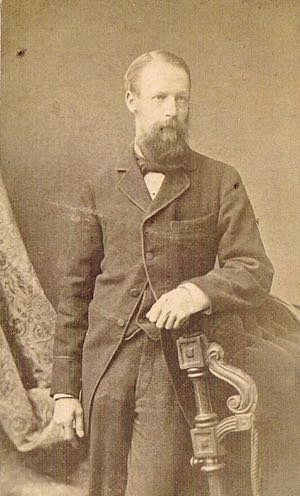 The founder of Elands, Henry Septimus Eland.
The founder of Elands, Henry Septimus Eland.
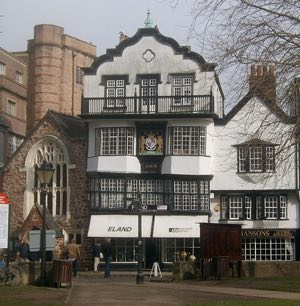 Eland
the Stationers at Mol's Coffee House.
Eland
the Stationers at Mol's Coffee House.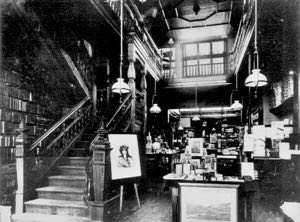 The interior of the
High Street shop - circa 1900.
The interior of the
High Street shop - circa 1900.
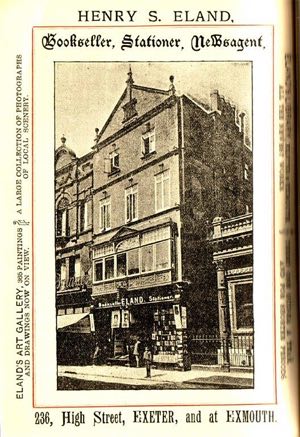 An advert for Eland's from 1894.
An advert for Eland's from 1894.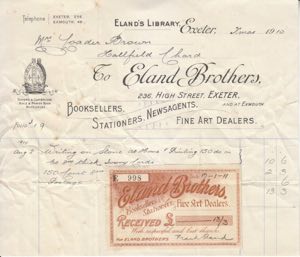 An invoice from Eland's with Frank Eland's signature.
An invoice from Eland's with Frank Eland's signature.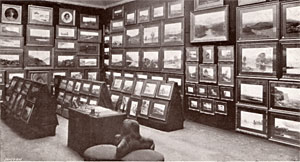 The art gallery at 236 High Street - circa 1910.
The art gallery at 236 High Street - circa 1910.
│ Top of Page │